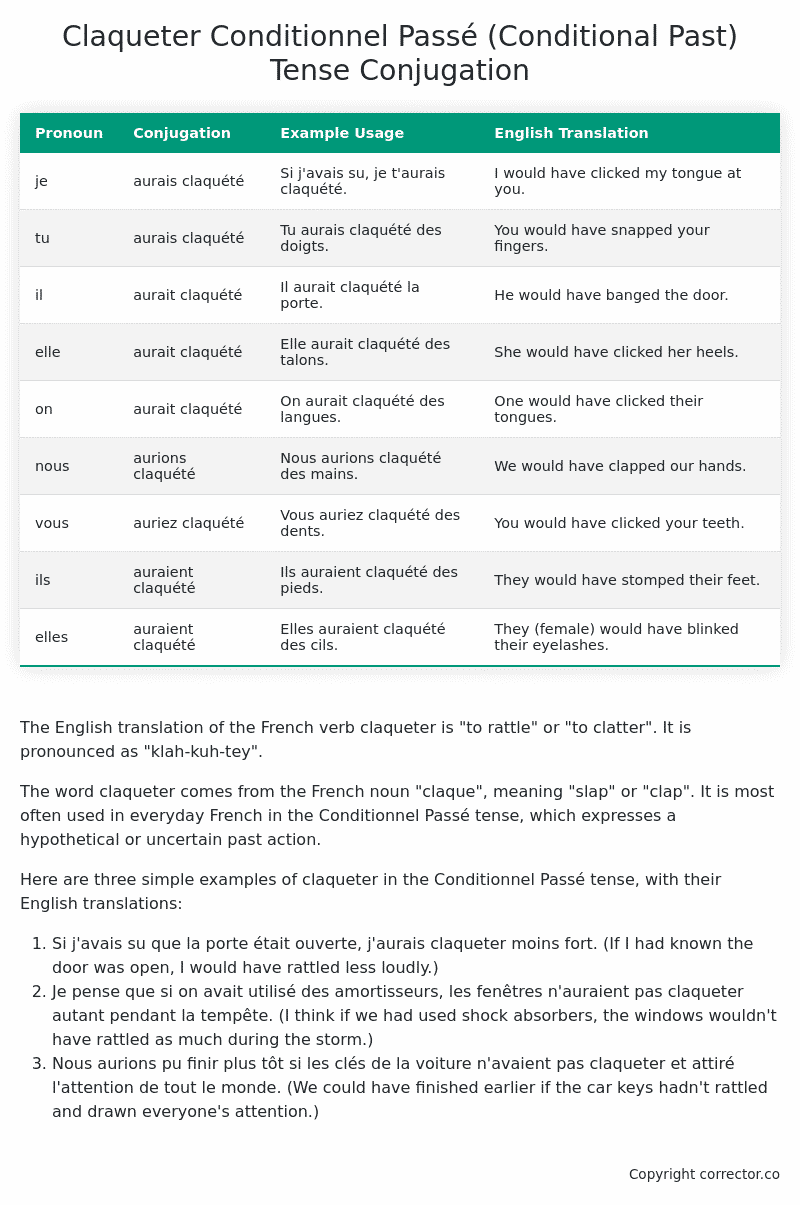Conditionnel Passé (Conditional Past) Tense Conjugation of the French Verb claqueter
Introduction to the verb claqueter
The English translation of the French verb claqueter is “to rattle” or “to clatter”. It is pronounced as “klah-kuh-tey”.
The word claqueter comes from the French noun “claque”, meaning “slap” or “clap”. It is most often used in everyday French in the Conditionnel Passé tense, which expresses a hypothetical or uncertain past action.
Here are three simple examples of claqueter in the Conditionnel Passé tense, with their English translations:
- Si j’avais su que la porte était ouverte, j’aurais claqueter moins fort. (If I had known the door was open, I would have rattled less loudly.)
- Je pense que si on avait utilisé des amortisseurs, les fenêtres n’auraient pas claqueter autant pendant la tempête. (I think if we had used shock absorbers, the windows wouldn’t have rattled as much during the storm.)
- Nous aurions pu finir plus tôt si les clés de la voiture n’avaient pas claqueter et attiré l’attention de tout le monde. (We could have finished earlier if the car keys hadn’t rattled and drawn everyone’s attention.)
Table of the Conditionnel Passé (Conditional Past) Tense Conjugation of claqueter
| Pronoun | Conjugation | Example Usage | English Translation |
|---|---|---|---|
| je | aurais claquété | Si j’avais su, je t’aurais claquété. | I would have clicked my tongue at you. |
| tu | aurais claquété | Tu aurais claquété des doigts. | You would have snapped your fingers. |
| il | aurait claquété | Il aurait claquété la porte. | He would have banged the door. |
| elle | aurait claquété | Elle aurait claquété des talons. | She would have clicked her heels. |
| on | aurait claquété | On aurait claquété des langues. | One would have clicked their tongues. |
| nous | aurions claquété | Nous aurions claquété des mains. | We would have clapped our hands. |
| vous | auriez claquété | Vous auriez claquété des dents. | You would have clicked your teeth. |
| ils | auraient claquété | Ils auraient claquété des pieds. | They would have stomped their feet. |
| elles | auraient claquété | Elles auraient claquété des cils. | They (female) would have blinked their eyelashes. |
Other Conjugations for Claqueter.
Le Present (Present Tense) Conjugation of the French Verb claqueter
Imparfait (Imperfect) Tense Conjugation of the French Verb claqueter
Passé Simple (Simple Past) Tense Conjugation of the French Verb claqueter
Passé Composé (Present Perfect) Tense Conjugation of the French Verb claqueter
Futur Simple (Simple Future) Tense Conjugation of the French Verb claqueter
Futur Proche (Near Future) Tense Conjugation of the French Verb claqueter
Plus-que-parfait (Pluperfect) Tense Conjugation of the French Verb claqueter
Passé Antérieur (Past Anterior) Tense Conjugation of the French Verb claqueter
Futur Antérieur (Future Anterior) Tense Conjugation of the French Verb claqueter
Subjonctif Présent (Subjunctive Present) Tense Conjugation of the French Verb claqueter
Subjonctif Passé (Subjunctive Past) Tense Conjugation of the French Verb claqueter
Subjonctif Imparfait (Subjunctive Imperfect) Tense Conjugation of the French Verb claqueter
Subjonctif Plus-que-parfait (Subjunctive Pluperfect) Tense Conjugation of the French Verb claqueter
Conditionnel Présent (Conditional Present) Tense Conjugation of the French Verb claqueter
Conditionnel Passé (Conditional Past) Tense Conjugation of the French Verb claqueter (this article)
L’impératif Présent (Imperative Present) Tense Conjugation of the French Verb claqueter
L’infinitif Présent (Infinitive Present) Tense Conjugation of the French Verb claqueter
Struggling with French verbs or the language in general? Why not use our free French Grammar Checker – no registration required!
Get a FREE Download Study Sheet of this Conjugation 🔥
Simply right click the image below, click “save image” and get your free reference for the claqueter Conditionnel Passé tense conjugation!

Claqueter – About the French Conditionnel Passé (Conditional Past) Tense
Formation
Common Everyday Usage Patterns
Expressing Unreal Past Scenarios
Polite Requests or Suggestions
Expressing Doubt or Uncertainty
Interactions with Other Tenses
Conditional Present
Indicative Past Tenses
Conditional Future
Summary
Want More?
I hope you enjoyed this article on the verb claqueter. Still in a learning mood? Check out another TOTALLY random French verb conjugation!


